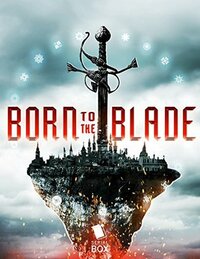Take a photo of a barcode or cover
5 reviews for:
Born to the Blade: The Complete Season One
Michael R. Underwood, Marie Brennan, Malka Older, Cassandra Khaw
5 reviews for:
Born to the Blade: The Complete Season One
Michael R. Underwood, Marie Brennan, Malka Older, Cassandra Khaw
adventurous
mysterious
tense
medium-paced
Plot or Character Driven:
A mix
Strong character development:
Yes
Loveable characters:
Complicated
Diverse cast of characters:
Yes
Flaws of characters a main focus:
Yes
adventurous
I really, really enjoyed everything about this. The floating worlds with the airstone mining, the sigils of magic, the politics, the characters, the cross-cutting motivations--it was all so well done! And Xe Sands is a great narrator, as usual. It's a pity there's no Season 2 coming, it seems, because there was definitely room for the story to continue.
Born to the Blade is a political fantasy way up high in the sky, where humanity lives on floating islands and casts magic by inscribing signals with swords.
Born to the Blade is also a serial story produced by Serial Box, which specializes in serialized fiction. Think of it like the season of a TV show. There’s smaller stories with their own arcs (“episodes”) that also work together to tell a larger story with its own arc (“seasons”). Each of Serial Box’s stories is written by a team of authors. In this case, Born to the Blade was created by Michael R. Underwood, but the writing team consists of him plus Marie Brennan, Malka Older, and Cassandra Khaw. All of these are exceedingly good authors, so that was another part of the draw for me. Episodes are written by various different authors. You might wonder if this creates an uneven story or noticeably different writing styles. It doesn’t. Born to the Blade flows seamlessly from episode to episode.
So now that you understand the format, what’s Born to the Blade really about? Well, as I mentioned before, it’s a political fantasy. In this specific instance, that means it follows diplomats. The island of Twaa-Fei is neutral ground among the different islands. It hosts the Warders’ Circle, an organization made up of diplomats from six prominent countries. Oftentimes, this means that there’s a deadlock — the Mertikan Empire has conquered two of the other countries represented in the Warders’ Circle and so has a powerful block.
As with so many stories, newcomers are central to Born to the Blade. Kris Denn has arrived to petition for their island gaining a seat in the Warder’s Circle; it’s a decision inspiring hope from the trade nation of Quloo, primary adversary of Mertikan, and wariness from the Empire itself. To gain the position of Warder, Kris will have to either gain votes by diplomacy or defeat each country’s representative in a duel where magical feats are performed via the motion of swords. However, Kris is not the only newcomer to the island. Oda no Michiko is proud to be a subject of the Mertikan Empire and to represent her colonized country, but at the start of the story, an incident with a famed rebel leader from her country’s era of freedom brings doubt to her mind. She begins to question what previously she’d taken for granted.
Of course, there are other characters aplenty. With a serialized story, you’ve got plenty of room for them! Kris and Michiko are the ones most prominent in the very first “episode,” but others are soon introduced. Born to the Blade is written in third person and jumps perspectives throughout the story, giving a wide range of views on the current events. These major characters are almost all diplomats involved with the Warders’ Circle. While the politics of nations takes center stage, they all have their own individual arcs as well.
The world building of Born to the Blade was pretty darn cool. Floating islands have been done before (Martha Wells springs to mind), but it was still wonderful to see them center stage in a fantasy novel. There’s also a twist — people born on certain islands have certain magical gifts. In Kris’s country, everyone has the ability to change the physical sex of their body at will, and the culture has correspondingly fluid notions of gender. In Michiko’s home, people have the ability to speak with their ancestors, something Michiko finds both a comfort and, as events in Born to the Blade continue, a trial. Gender and sexuality norms depend upon the country in question, but it’s a diverse array that steps outside of the Western patriarchy.
There’s a number of queer characters in Born to the Blade, most notably Kris, who is nonbinary and uses they/them pronouns. There is something I want to note here — the narrative kept misgendering Kris in what I suspect where typos. I thought at first that maybe Kris used multiple sets of pronouns… but then one passage said explicitly that anything other than they/them was wrong. Which makes it pretty awkward when the narrative itself uses the wrong pronouns…
Born to the Blade has a bit of a learning curve. You’re immediately thrown into a tense situation involving multiple countries, each with their own diplomats, powers, problems, ect. If you’re a long time fantasy reader, you’re probably used to this, and I don’t anticipate it being a problem for you. It wasn’t for me. At this point, I’ve learned to hang in and learn as I go.
Born to the Blade mixes political fantasy with action scenes, mostly duels of spellcraft-powered swordplay. The action scenes weren’t bad. But I soon found that I preferred pretty much everything else. This is how I am during some movies too, so it may just be a me thing.
Overall, I really enjoyed Born to the Blade. I quickly grew to like the characters and become invested in the plot. I can’t wait for season two!
I received an ARC in exchange for a free and honest review.
Review from The Illustrated Page.
Born to the Blade is also a serial story produced by Serial Box, which specializes in serialized fiction. Think of it like the season of a TV show. There’s smaller stories with their own arcs (“episodes”) that also work together to tell a larger story with its own arc (“seasons”). Each of Serial Box’s stories is written by a team of authors. In this case, Born to the Blade was created by Michael R. Underwood, but the writing team consists of him plus Marie Brennan, Malka Older, and Cassandra Khaw. All of these are exceedingly good authors, so that was another part of the draw for me. Episodes are written by various different authors. You might wonder if this creates an uneven story or noticeably different writing styles. It doesn’t. Born to the Blade flows seamlessly from episode to episode.
So now that you understand the format, what’s Born to the Blade really about? Well, as I mentioned before, it’s a political fantasy. In this specific instance, that means it follows diplomats. The island of Twaa-Fei is neutral ground among the different islands. It hosts the Warders’ Circle, an organization made up of diplomats from six prominent countries. Oftentimes, this means that there’s a deadlock — the Mertikan Empire has conquered two of the other countries represented in the Warders’ Circle and so has a powerful block.
As with so many stories, newcomers are central to Born to the Blade. Kris Denn has arrived to petition for their island gaining a seat in the Warder’s Circle; it’s a decision inspiring hope from the trade nation of Quloo, primary adversary of Mertikan, and wariness from the Empire itself. To gain the position of Warder, Kris will have to either gain votes by diplomacy or defeat each country’s representative in a duel where magical feats are performed via the motion of swords. However, Kris is not the only newcomer to the island. Oda no Michiko is proud to be a subject of the Mertikan Empire and to represent her colonized country, but at the start of the story, an incident with a famed rebel leader from her country’s era of freedom brings doubt to her mind. She begins to question what previously she’d taken for granted.
Of course, there are other characters aplenty. With a serialized story, you’ve got plenty of room for them! Kris and Michiko are the ones most prominent in the very first “episode,” but others are soon introduced. Born to the Blade is written in third person and jumps perspectives throughout the story, giving a wide range of views on the current events. These major characters are almost all diplomats involved with the Warders’ Circle. While the politics of nations takes center stage, they all have their own individual arcs as well.
The world building of Born to the Blade was pretty darn cool. Floating islands have been done before (Martha Wells springs to mind), but it was still wonderful to see them center stage in a fantasy novel. There’s also a twist — people born on certain islands have certain magical gifts. In Kris’s country, everyone has the ability to change the physical sex of their body at will, and the culture has correspondingly fluid notions of gender. In Michiko’s home, people have the ability to speak with their ancestors, something Michiko finds both a comfort and, as events in Born to the Blade continue, a trial. Gender and sexuality norms depend upon the country in question, but it’s a diverse array that steps outside of the Western patriarchy.
There’s a number of queer characters in Born to the Blade, most notably Kris, who is nonbinary and uses they/them pronouns. There is something I want to note here — the narrative kept misgendering Kris in what I suspect where typos. I thought at first that maybe Kris used multiple sets of pronouns… but then one passage said explicitly that anything other than they/them was wrong. Which makes it pretty awkward when the narrative itself uses the wrong pronouns…
Born to the Blade has a bit of a learning curve. You’re immediately thrown into a tense situation involving multiple countries, each with their own diplomats, powers, problems, ect. If you’re a long time fantasy reader, you’re probably used to this, and I don’t anticipate it being a problem for you. It wasn’t for me. At this point, I’ve learned to hang in and learn as I go.
Born to the Blade mixes political fantasy with action scenes, mostly duels of spellcraft-powered swordplay. The action scenes weren’t bad. But I soon found that I preferred pretty much everything else. This is how I am during some movies too, so it may just be a me thing.
Overall, I really enjoyed Born to the Blade. I quickly grew to like the characters and become invested in the plot. I can’t wait for season two!
I received an ARC in exchange for a free and honest review.
Review from The Illustrated Page.


